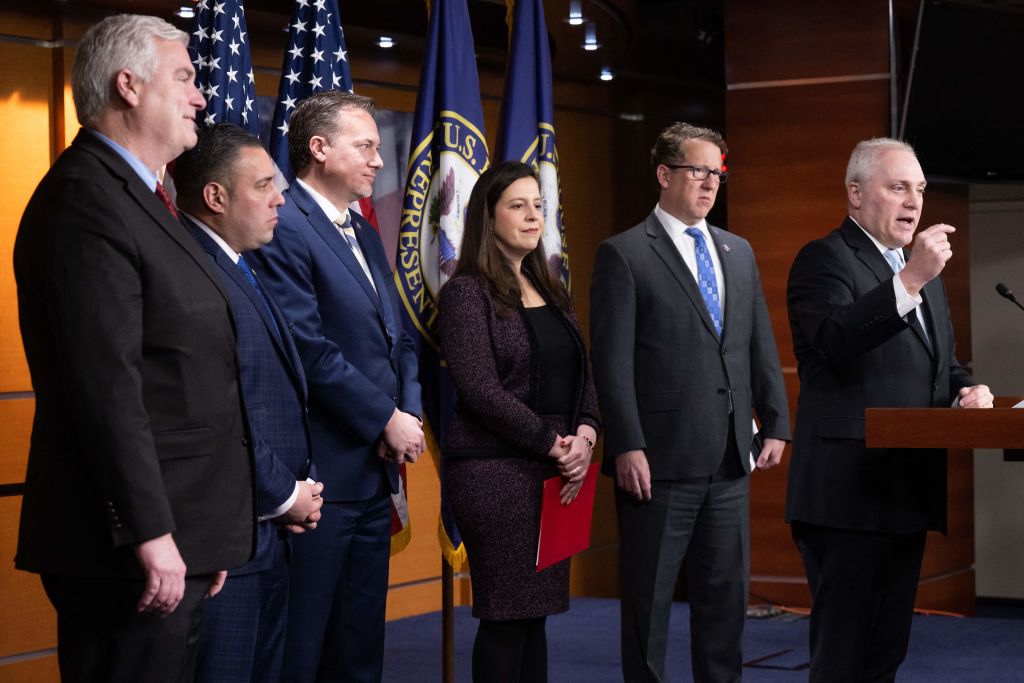Good afternoon. The House has a speaker and a set of rules—ordinarily a formality at the start of each Congress, but for this closely divided chamber, a bit of a saga. Now, Republicans are moving to items they largely agree on: messaging bills and investigations.
Two New Select Committees
Republicans itching for reprisals in the wake of last year’s FBI search of former President Donald Trump’s Florida property may soon have a dedicated select committee for the task.
Members will vote today on forming a select committee with a broad mandate to investigate the federal government and empowered to dig into ongoing criminal investigations. This was a key demand among House Freedom Caucus members who initially opposed House Speaker Kevin McCarthy’s bid for the gavel.
The subcommittee will be organized underneath the House Judiciary Committee, which is set to be chaired by Ohio Rep. Jim Jordan. Its purpose has been likened to the Church Committee named after Sen. Frank Church, which investigated intelligence community activities in the 1970s. It’s not yet clear who the new panel’s Republican members will be, nor which Democrats will participate.
The resolution forming the “Select Committee on the Weaponization of the Federal Government” calls on the panel to investigate the executive branch’s powers to collect information on citizens, federal cooperation with the private sector “to facilitate action against American citizens,” and “any other issues related to the violation of the civil liberties of citizens of the United States.”
Special counsel Jack Smith, overseeing the criminal investigation into Trump’s handling of classified information after his presidency, is likely to receive much of the panel’s attention. Critics have also raised concerns about whether the select committee will use its power to probe ongoing investigations involving current members of Congress such as Rep. Scott Perry. Either way, it’s clear many of the highest-profile fights of this Congress may play out in this panel.
The House is also set to vote today to establish a select committee on strategic competition with China, an endeavor far more likely to be bipartisan.
Lawmakers broadly agree on the threats posed by an increasingly aggressive Chinese government, and Wisconsin Rep. Mike Gallagher, who is expected to chair the panel, emphasized in his recent interview with The Dispatch that he wants ideas and participation from Democrats.
One of Gallagher’s early priorities: a hearing on how America reached today’s urgent competition with China.
“Why did the bipartisan bet that both parties made on China fail?” he asked. “What were the assumptions underlying it that were wrong? What did we misunderstand about the Chinese Communist Party that we need to understand in order to have a successful policy going forward?”
Read more of his plans for the committee here.
It may take several weeks for existing committees and the new ones to get off the ground: Republican leaders delayed some organizing decisions until after the speakership race instead of addressing the question of chairmanships beforehand as is typical practice. Because of that, and as staff take the time to prepare, first hearings for some panels may not come until late February or March.
Also on the Docket: Abortion
Republicans will advance legislation related to abortion this week, following through on GOP campaign trail priorities. These are unlikely to win enough support in the Democratic-held Senate to become law.
One resolution would condemn attacks on anti-abortion facilities since the Supreme Court’s move over the summer to send abortion policy decisions back to the states. It also includes language recognizing “the sanctity of life and the important role pro-life facilities, groups, and churches play in supporting pregnant women, infants, and families.”
The resolution further calls on the Biden administration to use all appropriate law enforcement authorities to uphold public safety and protect the rights of the facilities in question.
Another bill scheduled for upcoming consideration makes permanent a ban on using federal funding for abortions. It also blocks health care facilities owned or operated by the federal government—and physicians and others employed by the government—from providing abortions. The same bill has passed the House repeatedly in recent years but has not overcome opposition from Democrats in the Senate.
A third bill, the Born-Alive Abortion Survivors Protection Act, designates any infants born alive after attempted abortions as legal persons and requires medical practitioners present for such births to “exercise the same degree of professional skill, care, and diligence to preserve the life and health of the child as a reasonably diligent and conscientious health care practitioner would render to any other child born alive at the same gestational age.”
It lays out penalties of fines and up to five years in prison for medical practitioners who do not follow the legislation’s requirements, and it protects mothers of infants born alive after abortions from similar prosecution.
When the House considered the same bill as an amendment to a different measure in 2020, three Democrats joined Republicans in supporting it. Those three Democrats are no longer in Congress, though. It’s unclear if any new Democratic members may cross the aisle to support it.
A full list of bills the House may consider this week, including immigration bills and law enforcement messaging legislation, is available here.
A Look at One McCarthy Concession
My colleague Audrey has a piece on the site today diving into a McCarthy-aligned campaign fund’s agreement not to spend in safe GOP districts in open primaries. She writes:
The deal proved pivotal to winning over 20 Republican holdouts, many of whom McCarthy-aligned donors earlier had opposed in GOP primaries. The pledge was also a blatant power play from the Club for Growth, as it could result in more Freedom Caucus-style candidates making it through Republican primaries and into the House—further weakening McCarthy’s hand in future negotiations with his own party.
But some members, like Rep. Lauren Boebert, aren’t entirely convinced it will be impactful for conservatives.
“I think they’re liars,” Boebert told The Dispatch of the deal last week. Audrey notes:
It’s unclear how much of an effect CLF’s concession will have on the next campaign cycle, considering the super PAC “will continue to support incumbents in primaries as well as challengers in districts that affect the Majority, which proved to be critical to winning the Majority in 2022,” per the deal. There’s also no clear definition of what the CLF means by open and “safe” Republican districts.
Read more here.









Please note that we at The Dispatch hold ourselves, our work, and our commenters to a higher standard than other places on the internet. We welcome comments that foster genuine debate or discussion—including comments critical of us or our work—but responses that include ad hominem attacks on fellow Dispatch members or are intended to stoke fear and anger may be moderated.
You are currently using a limited time guest pass and do not have access to commenting. Consider subscribing to join the conversation.
With your membership, you only have the ability to comment on The Morning Dispatch articles. Consider upgrading to join the conversation everywhere.